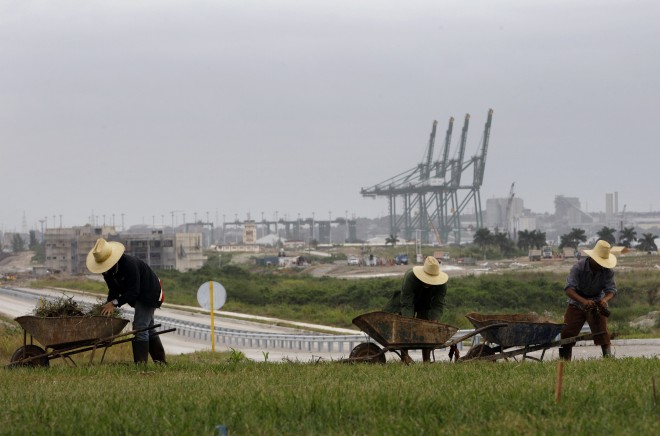Cuban lawmakers weigh key foreign investment law

In this Nov. 6, 2013, file photo, workers landscape the area near a new port under construction in Mariel, Cuba. Cuban authorities are on the verge of enacting a new foreign investment law considered one of the most vital building blocks of President Raul Castro’s effort to reform the country’s struggling economy. (AP Photo/Franklin Reyes, File)
HAVANA — Cuban lawmakers meet in Havana on Saturday for an extraordinary session on a proposed law that seeks to make it more attractive for foreign investors to do business in and with the country.
Expected to be approved by the more than 600 deputies, the bill would replace Cuba’s 1995 foreign investment law which has lured less overseas capital than the island’s Communist leaders had hoped, contributing to sluggish economic growth.
Some details of the legislation emerged in official media in recent days. Among other things, it would cut taxes on profits by about half, to 15 percent, and make companies exempt from paying taxes for the first eight years of operation.
An exception for companies that work in the exploitation of natural resources, such as nickel or fossil fuels, would establish taxation rates in such cases as high as 50 percent.
Meanwhile, many foreigners doing business with the island would be exempt from paying personal income tax.
Article continues after this advertisementWholly foreign-owned investment projects would be explicitly allowed, something that in practice is essentially unheard of here.
Article continues after this advertisementForeign investment will reportedly be allowed in all sectors except health care and education.
The investment law is a fundamental part of President Raul Castro’s package of reforms, begun in 2008 with the stated goal of “updating” Cuba’s economic model.
Hundreds of thousands of Cubans are now legally working independently of the state in a nascent private sector, though authorities say they are not abandoning socialism.
The body usually meets twice a year, in July and December. Castro announced Saturday’s extraordinary session late last year.
Foreign media were not invited to attend the closed-door gathering.
RELATED STORIES
Stagnant Cuban economy awaits reform
Cuba’s Raul Castro mentions possible retirement